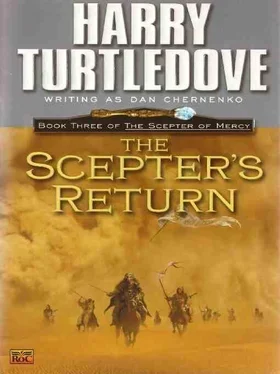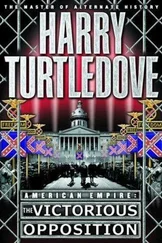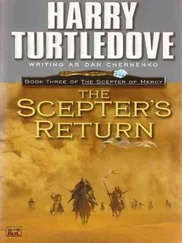Harry Turtledove - The Scepter's return
Здесь есть возможность читать онлайн «Harry Turtledove - The Scepter's return» весь текст электронной книги совершенно бесплатно (целиком полную версию без сокращений). В некоторых случаях можно слушать аудио, скачать через торрент в формате fb2 и присутствует краткое содержание. Жанр: Фэнтези, на английском языке. Описание произведения, (предисловие) а так же отзывы посетителей доступны на портале библиотеки ЛибКат.
- Название:The Scepter's return
- Автор:
- Жанр:
- Год:неизвестен
- ISBN:нет данных
- Рейтинг книги:4 / 5. Голосов: 1
-
Избранное:Добавить в избранное
- Отзывы:
-
Ваша оценка:
- 80
- 1
- 2
- 3
- 4
- 5
The Scepter's return: краткое содержание, описание и аннотация
Предлагаем к чтению аннотацию, описание, краткое содержание или предисловие (зависит от того, что написал сам автор книги «The Scepter's return»). Если вы не нашли необходимую информацию о книге — напишите в комментариях, мы постараемся отыскать её.
The Scepter's return — читать онлайн бесплатно полную книгу (весь текст) целиком
Ниже представлен текст книги, разбитый по страницам. Система сохранения места последней прочитанной страницы, позволяет с удобством читать онлайн бесплатно книгу «The Scepter's return», без необходимости каждый раз заново искать на чём Вы остановились. Поставьте закладку, и сможете в любой момент перейти на страницу, на которой закончили чтение.
Интервал:
Закладка:
But the gods sent earthquakes. This collapse was man-made. Grus and Pterocles and the captain who hadn't had to go down into the mine all whooped and clapped their hands. They pounded one another on the back and embraced like a band of brothers.
A great cloud of dust rose from the shattered wall. Smoke rose, too, as rents in the ground exposed the fire down below. How many men lay crushed and maimed among the tumbled blocks of stone?
They are the enemy, Grus reminded himself. They stand between us and the Scepter of Mercy, between us and a crushing defeat for the Banished One. A Menteshe who caught him would have cut his throat right away — or else cut his throat after torturing him first. He knew that full well. The men who reverenced the Banished One had chosen evil. Grus knew that, too. But they were still men, and he flinched a little, imagining their suffering.
Homs bellowed within the Avornan lines. Like long tongues, the gangplanks stuck out over the ditch. Soldiers ran across them. Cheering, the men rushed toward the downfallen length of wall. They scrambled over and through the rubble and into Trabzun.
Not all the city's defenders had perished, of course. Most of the wall and most of the garrison remained intact. But then, most of a man remained intact after a spear pierced his chest. He was likely to die even so. And Trabzun, with its defenses breached, was likely to fall.
Menteshe from the undamaged stretches of the wall rushed to try to push back the Avornans. Seeing that, more Avornans went forward all around the city. Now scaling ladders could thud into place against the walls. Now soldiers could rush up them to gain the battlements. Some of the ladders went over. With the defenders so distracted, though, more of them stayed in place. Avornans atop the wall waved banners so the besiegers could see they'd won their lodgements.
Everywhere in Trabzun, Avornans who could speak a little of the Menteshe language shouted, "Surrender! We take prisoners!" Scrawny defenders, their hands in the air and dismay naked on their faces, began stumbling out of the city, herded along by Avornans.
When Trabzun's main gate swung open, Grus whooped again. He thumped Pterocles almost hard enough to knock him flat. "It's ours!" he shouted. "Trabzun is ours!"
"Uh, yes, Your Majesty. So it is." The wizard straightened up. "A good thing, too. If they'd thrown us back, you probably would have murdered me."
"Don't tempt me." Grus sounded as though he was joking, which he was. Pterocles flinched even so. Grus felt ashamed of himself. If a king felt like murdering someone, he could. Who would punish him? Avornis had known its share of bloody-handed tyrants. He didn't care to be remembered as another one. Setting a hand — gently — on Pterocles' shoulder, he said, "I'm sorry."
A king might murder with impunity. Apologizing looked to be something else again. Pterocles stared at him as though he'd said something in some exotic tongue. "I didn't mean anything by it, Your Majesty," the wizard said. He might have been the one at fault.
"I don't think either of us did." Grus laughed at himself; he'd just reduced their conversation to meaninglessness.
His guards weren't laughing when he decided to go into Trabzun late that afternoon. Only spatters of fighting were left in the city by then, but they didn't like it anyhow. "Too many places for enemy soldiers to hide," one of them said. "We won't have the place cleaned out for days. If one of those buggers lets fly with a bow…"
"That's what you people are for, isn't it?" Grus asked mildly.
"Yes, Your Majesty, but there's such a thing as taking chances when you don't have to," the royal guardsman insisted. Grus muttered to himself. The man had a better point than he cared to admit.
Grus finally entered Trabzun two days later. The guards were still unhappy, and so was he. He supposed that made for a reasonable compromise. He went in through the main gate, not over the tumbled masonry the mine had brought down.
Most of the people left in the city were desperately thin. By then, the Avornans had taken the men from the garrison out of Trabzun. They had been in reasonably good shape. They'd kept most of the food for themselves, leaving the civilians — especially the women and children — just enough to sustain life.
"Will you feed us?" a man called in Avornan. By his hazel eyes and light brown hair, he was descended from the folk who'd lived here when Trabzun was Avornan Trapezus. By his hollow cheeks and broomstick forearms, he needed feeding.
"We'll do everything we can," Grus said. It wasn't quite a promise, as he was uncomfortably aware. He had plenty to keep his soldiers fed. His soldiers and the folk of Trabzun? He wasn't so sure.
A woman even skinnier than the man who'd called held a baby in her arms. The baby's belly stuck out, not because it was plump but on account of starvation. Grus had seen children like that in districts where the crops failed and famine set in. The baby, too listless even to wail, stared at him with dull eyes.
Grus shouted for a quartermaster. When the officer came up to him, he said, "Find out how much the granaries here hold. Feed these people with it. They're going to start dying soon."
"Yes, Your Majesty." The man sketched a salute and hurried away.
So much to do, Grus thought. Getting the fallen part of the wall into defensible shape would keep his engineers busy. He'd have to garrison Trabzun if he didn't want to lose it as soon as he moved on. The Menteshe would try to take it back. He didn't intend to let them. How much was in the granaries? Enough to feed the locals and his army, too? That would be good. It would mean he wouldn't have to bring so much down from the north. How much farther could he push on in this campaigning season? Could he hold everything his army had taken?
Behind all those questions — every one of them important — lay another, one that seemed to shrink them into insignificance. What would the Banished One do now that the Kingdom of Avornis had succeeded south of the Stura for the first time in centuries? What would he do? What could he do?
The king stared south. We'll find out, he thought, and hoped learning the answer wouldn't prove too expensive.
Ceremony dictated that the king and queen of Avornis should eat together. Lanius and Sosia bent ceremony as far as they could. He didn't mind her company — he never had — but she wanted nothing to do with him. She couldn't get all of what she wanted, though. Sometimes, as at supper one evening, they found themselves at the same table.
Sosia looked daggers at him. By the way she eyed the knife beside her plate, she might have been thinking of using it as a dagger. "How are you today?" he asked, doing his best to pretend everything was fine.
"I was all right," she said pointedly, and sent him another poisonous stare.
"I had a letter from your father this afternoon," Lanius said.
"Did you?" A little interest stirred in Sosia's voice. That could be important. Of course, she wasn't altogether happy with Grus, either, for he had as much trouble staying faithful to her mother as Lanius did to her. Grudgingly, she asked, "What did he say?"
Before Lanius could answer, the servants brought in the meal — roast mutton with cabbage and parsnips. The spicy scent of crushed mint leaves rose from the mutton. Some sort of cheese sauce covered the parsnips. The cabbage was what it was. A servant splashed sweet red wine into Lanius' goblet, and into Sosia's. At the king's gesture, the servants withdrew.
Lanius raised his silver goblet to Sosia. "Your health," he said.
"What did the letter say?" she asked again, instead of pledging him in return.
Biting his lip, he answered, "Trabzun has fallen." Even good news fell flat when delivered to such a hostile audience.
Читать дальшеИнтервал:
Закладка:
Похожие книги на «The Scepter's return»
Представляем Вашему вниманию похожие книги на «The Scepter's return» списком для выбора. Мы отобрали схожую по названию и смыслу литературу в надежде предоставить читателям больше вариантов отыскать новые, интересные, ещё непрочитанные произведения.
Обсуждение, отзывы о книге «The Scepter's return» и просто собственные мнения читателей. Оставьте ваши комментарии, напишите, что Вы думаете о произведении, его смысле или главных героях. Укажите что конкретно понравилось, а что нет, и почему Вы так считаете.












